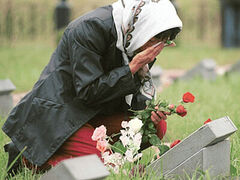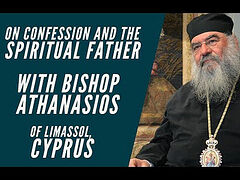A talk with the faithful of the Metropolis of Limassol, September 28, 2022, on 2 Cor. 7:5-13
How can a man avoid this worldly sorrow? He must live the spiritual life, learn to pray, read the lives of the saints, sincerely confess, and participate in the Sacraments of the Church, because the Sacraments heal a man’s soul, save him from worldly sorrow, and give sorrow for God’s sake, which leads to salvation. In this way, a man finds consolation. When we confess, we cleanse our soul, the grace of God settles in our heart, and our whole soul and our entire existence are comforted.
This worldly sorrow is a big problem for the whole world today, because people don’t have enough strength to endure it and therefore they fall into despondency and suffer greatly. However, I think that a man can gradually change this worldly sorrow into sorrow for God’s sake and find peace in his soul. I repeat again, that this isn’t about medical cases, when someone is diagnosed with depression, because that’s different from this sadness that the Apostle Paul is speaking about. Medical depression implies a medical approach to its treatment. But worldly sorrow, which is cured by the Holy Spirit, is from the spiritual realm.
The Apostle Paul continues, saying:
For behold this selfsame thing, that ye sorrowed after a godly sort, what carefulness it wrought in you, yea, what clearing of yourselves, yea, what indignation, yea, what fear, yea, what vehement desire, yea, what zeal, yea, what revenge! (2 Cor. 7:11).
Here the Apostle says that sorrow for God’s sake brought the Corinthians good results; that the man who sorrows for God’s sake, who is zealous for God, isn’t overwhelmed by despondency, and he doesn’t say: “I won’t do anything. I don’t expect anything good, and don’t want to see anyone!” but he says: “I’ll do something for God. I’m going to pray more, I’m going to labor more, I’m going to have zeal in prayer and repentance.” This requires zeal, and if a man acts this way, he’ll have the grace of God in his heart. So look at what zeal this sorrow, which happens by God’s will, has given you, what need for excuses it has caused in you, what indignation, what fear of the consequences, what desire to see me, what zeal, what desire to punish evil—this is how the Apostle Paul addresses the Corinthians. And then he adds: In all things ye have approved yourselves to be clear in this matter (2 Cor. 7:11). This case concerned the plight of the Corinthian Christians, which was connected with sins of the flesh, very serious, especially for those times. But when the Corinthians were grieved, then they found more zeal for good. They wanted to see the Apostle, to labor more and change, and their zeal helped them.
Wherefore, though I wrote unto you, I did it not for his cause that had done the wrong, nor for his cause that suffered wrong, but that our care for you in the sight of God might appear unto you (2 Cor. 7:12). The Apostle Paul says that he wrote them this epistle and grieved them not because he wanted to grieve them, but because he wanted to show them the trouble that had happened to them, so they would come to the right spiritual state, in which they were now, and so they might have such zeal for good. If we have a certain state of mind, experience various feelings and see that these feelings lead us to repentance, light, consolation, humility, then that means that it’s a state from God. As Christ said: Ye shall know them by their fruits (Mt. 7:16). If the tree is good, then its fruits will be good, and if the tree is rotten, then its fruits will be rotten. The internal state of a man can be assessed by its fruits. And so the Corinthians had their fruits of zeal in the spiritual life. It turns out that by his action, the Apostle aroused them to spiritual vigil.
It's important for parents and spiritual guides to know this: When we do something in relation to our children, spiritual children, or disciples, we must always consider whether it will bring good or bad results. Will it help our children become better, more conscious, humbler, and more diligent? Or will it do the opposite? We can’t just say the right words, but we have to also think about what they will lead to, because discernment, as we have already said, is the greatest of all the virtues. Discernment presupposes that even when we do good, we have to do it the right way. Let’s say we want to make a remark to someone that will be for his benefit. If we can’t say it kindly, then the whole thing can turn into evil. Therefore, we always have to weigh the results and understand that the other person has his limits.
Therefore we were comforted in your comfort: yea, and exceedingly the more joyed we for the joy of Titus, because his spirit was refreshed by you all (2 Cor. 7:13). As you can see, the Apostle Paul doesn’t deny that he needed human comfort. So human consolation should also be important for us. If we have it—good; if not—that’s better, because then the Lord will comfort us. As Elder Paisios said, when we have no human comfort, this is a difficult state, of course, but then we have the consolation of God. When there’s no human presence, there’s God’s presence. Therefore, the saints preferred not to have human consolation, but to have God present in their lives. However, this is very difficult and demands much patience and labor.
There was one Romanian elder living on Mt. Athos. One day he came to visit us at Koutloumousiou Monastery, where I lived for two years and had the obedience of gatekeeper. He lived in the desert and would always arrive hungry. He was short of stature, hunched over, with a knapsack on his back, and always on foot. One day he came to see us at the monastery, and I asked him: “Geronda Sergei, how are you?” He said: “I want to eat.” To tease him a little bit, I said: “We don’t have any food.” And he said to me: “No worries. If I eat, that’s good, and if not, that’s better.” In this way, he wanted to tell us: “If you have food and you can give it to me to eat, you’ll do well, you’ll give me human comfort, but if not, and you don’t give me anything to eat, and I stay hungry—that’s even better, because then the Lord God Himself will comfort me.” Such people had hope in God.
But anyways, we’re simple people, and we need human comfort. Thus, I will repeat this to you again, so we don’t deprive our loved ones of the comfort we could give them. Perhaps we can comfort someone by visiting them, supporting them with a kind word, or expressing sympathy and understanding. You have to show a person that you understand them, and not just say something that the person isn’t ready to accept just then, for example. No matter how spiritual what you say is, if the person doesn’t have the necessary spiritual strength to hear you, it’ll be hard for him to listen to it. He may reject what you say, or even turn away from God, because he’s not ready to hear your spiritual words just then.
I was eighteen when I went to study in Thessaloniki. The climate there is quite different from Cyprus’. It’s cold and damp. I’ve always loved to eat, and in that climate, I especially wanted to eat, and I was always hungry. I met a very good spiritual father there, but he was an ascetic. We all lived in the St. Theodora dormitory together, and I asked him: “Father, what are we having for dinner today?” and he said: “Have some yogurt.” How could one yogurt be enough for me? I needed a whole tub full of food. I told him: “Father, I won’t last too long on one yogurt,” and he said: “One yogurt.” Two weeks later I parted with this spiritual father, because he didn’t understand that I was hungry all the time. Then I found another spiritual father who was also a doctor by training, a colonel, and generally a very experienced elderly man. And whenever he saw me, he would ask: “My dear, have you eaten today?” “No, Geronda, I haven’t eaten anything,” I would answer him. “Go eat something,” he’d say to me and give me some money for the cafeteria near the church. Or sometimes when we’d go and we were waiting in line for confession with him, he’d come out, give us some money, and send someone for food so that we could refresh ourselves while we waited. He understood us. And despite the fact that he was an ascetic, he understood that we were eighteen and wanted to eat. Conversely, that other elder-ascetic who didn’t understand us wound up alone, because we all left him. He would complain sometimes that we weren’t coming to him for confession. But how could we go to him if he didn’t understand us? When we lived with St. Paisios in Kapsala for a while, he also didn’t eat anything, but since he knew that I love to eat, he would say to me: “Go to Stavronikita Monastery and then come back here.” Stavronikita was near his kallyva, about a half hour on foot. Since he himself didn’t have any food for us, he’d send us to the neighboring monastery.
Therefore, it’s very important to show a person that you understand them. If you want to comfort someone, but instead of showing that you understand his plight you start trying to teach him, then he’s unlikely to be comforted by you. We’ve seen how our holy elders acted. When our brotherhood had some difficulties, we went to see Elder Aemilianos of Simenopetra, and he listened to us very attentively—although our issue wasn’t very serious, as it seems to me now. What impressed us then was the Elder’s reaction. He didn’t tell our Elder, “Geronda, pray and God will help you. It’ll all be okay.” Rather, he said: “Geronda, indeed you have a very difficult situation.” And we saw that he truly understood us. Then he told us how to solve the problem.
One day I went to the hospital (here in Limassol), to the ER, and I saw an old man there, moaning: “It hurts, it hurts.” There was a doctor there, and he said to me: “Don’t pay any attention, there’s nothing wrong with him.” So I went over to him and asked: “What hurts?” “I feel very bad,” he said. “Don’t worry, it’ll pass,” I told him. “It’ll pass, you say? When you yourself get sick, then you’ll see.” At that moment I realized that even if this man was making up his suffering, he was still suffering, and he answered me correctly: When you yourself get sick, you won’t talk like that anymore. Therefore, psychologists also use a particular very fashionable term today—empathy, which is nothing other than what our Holy Fathers say: Love your neighbor as yourself, i.e., take the place of another, where his pain becomes your pain.
A boy came to the Metropolis yesterday, crying that someone had stolen his bike. For us, this is nothing. For the boy, it was a great tragedy, because he was afraid to go home and confess to his father that someone had stolen his bike. By giving him a new bike, we helped and comforted him. But if we had said to him: “Why are you crying about something so silly? It’s just some thing—why are you thinking about material things”—he would’ve gotten offended and left. He would’ve said we don’t understand him. But the saints understood people very well and didn’t neglect their problems; they didn’t say: “What are you telling me all this nonsense for?” “Don’t think about it,” and so on, as we usually tell people.
This is what I wanted to tell you today.




